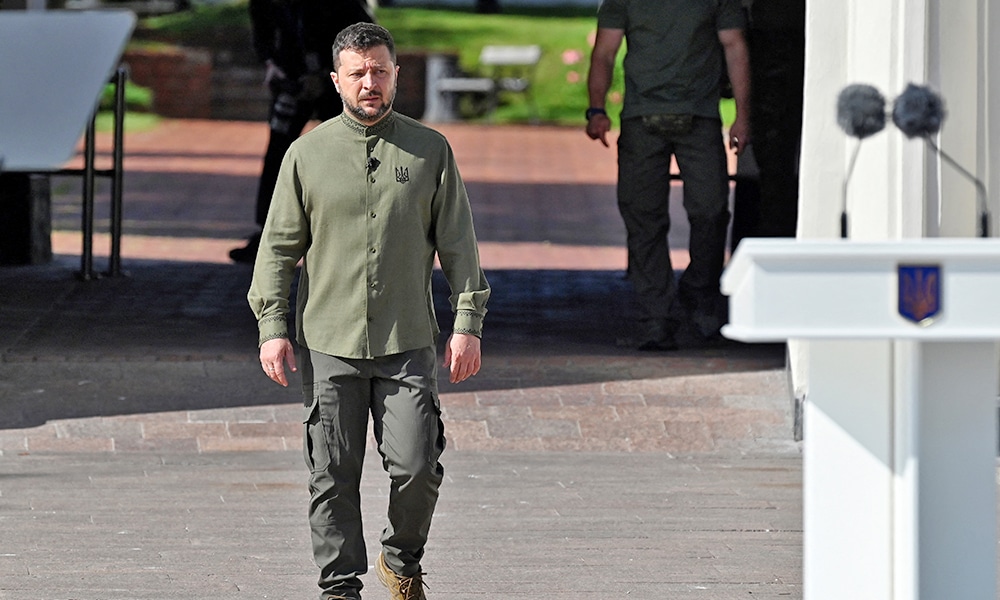UNITED NATIONS: More than 140 world leaders will head to the United Nations next week at a time of myriad crises, as a starring role for Ukraine’s leader may only highlight the growing global fragmentation.
Ukrainian President Volodymyr Zelensky, who a year ago was obliged to appear virtually, will join leaders including President Joe Biden when the UN General Assembly formally opens Tuesday as he seeks to rally support against Russia’s bloody invasion. But while Western powers have rallied behind Ukraine, the war has laid bare deep divisions, with some developing countries uneasy about the billions of dollars devoted to Kyiv, even as the war also affects the poor by driving up food prices.
UN Secretary-General Antonio Guterres will kick off the week on Monday with a summit on development, hoping to keep a focus on meeting elusive goals for helping the neediest countries.
"We will be gathering at a time when humanity faces huge challenges—from the worsening climate emergency to escalating conflicts, the global cost-of-living crisis, soaring inequalities and dramatic technological disruptions,” Guterres said of the General Assembly. "People are looking to their leaders for a way out of this mess. Yet in the face of all this and more, geopolitical divisions are undermining our capacity to respond,” he said. "A multipolar world is emerging. Multipolarity can be a factor of equilibrium. But it can also lead to escalating tensions, fragmentation and worse.”
Zelensky is expected Wednesday to attend a special session on Ukraine at the Security Council—raising the possibility of a dramatic confrontation with Russia, a veto-wielding permanent member.
A day later, Zelensky will head to Washington for talks at the White House and on Capitol Hill. Despite the starring role, Zelensky "has to tread carefully,” said Richard Gowan, an expert on the United Nations at the International Crisis Group. "If he’s too hardline, he may actually turn this opportunity into a bit of a diplomatic crisis,” he said.
An overwhelming majority of countries have voted to condemn Russia’s invasion launched in February 2022. But leaders such as Brazilian President Luiz Inacio Lula da Silva "have made it very clear that they believe that now it’s time for diplomacy, and you may see quite a lot of friction between the Ukrainians and countries from the Global South,” Gowan said.
A senior European diplomat said that the war was "stealing away political and economic attention” from other pressing problems such as food insecurity, the climate crisis, inequalities and access to finance. "There is a growing rift between the developing world and the developed world. Preparing for this week is also making sure that that rift doesn’t grow further,” the diplomat said on condition of anonymity.
Commitments sought
At the summit on Monday, governments will be urged to show new urgency in meeting the Sustainable Development Goals -- 17 wide-ranging ambitions that the United Nations wants to fulfill by 2030 including ending extreme poverty. A UN report warned that the goals are in peril, with the COVID-19 pandemic as well as crushing debts setting back efforts in much of the developing world. While much of the attention will be on Ukraine at the UN General Assembly, intense diplomacy is also expected on Haiti, with meetings set to jumpstart long-running efforts to send an international force to the impoverished nation ravaged by gang violence.
Iranian President Ebrahim Raisi will also be in attendance just as Tehran completes a prisoner deal with arch-nemesis the United States, but no talks are expected between the clerical ruler and Biden.
Biden will meet, however, with Israeli Prime Minister Benjamin Netanyahu, giving him time in New York—but not a White House invitation. Biden, while seeking to avoid major clashes with Netanyahu, has shown frustration with the US ally’s hard-right government, including its controversial overhaul of the judiciary and pursuit of settlements in the occupied West Bank.
Meanwhile, Russia said Saturday that its forces had not been pushed out of Andriivka, a village near the key frontline town of Bakhmut, a day after Ukraine said it had "liberated” the site and inflicted heavy losses on enemy troops. Andriivka is around 14 kilometers (nine miles) south of Bakhmut in the Donetsk region, where Kyiv has been pushing back against Moscow’s forces since June.
Ukraine’s General Staff said Friday that the village was back under Ukrainian control.
But in its daily bulletin, Russia’s defense ministry said that "in the Donetsk sector, the enemy... continues to carry out assaults... trying in vain to dislodge Russian troops in the localities of Andriivka and Klishchiivka”. The statement adds to the confusion surrounding the situation on the ground in the village, which had just a few dozen residents before Russia’s offensive. -- AFP


